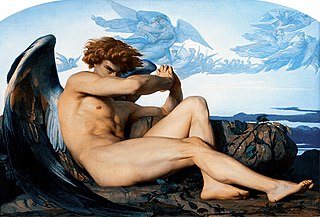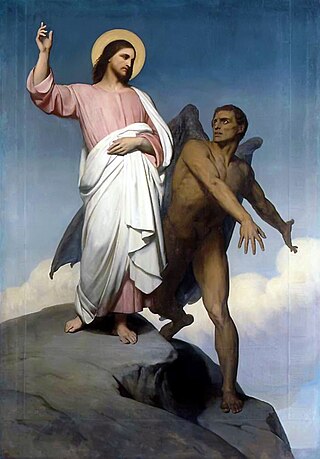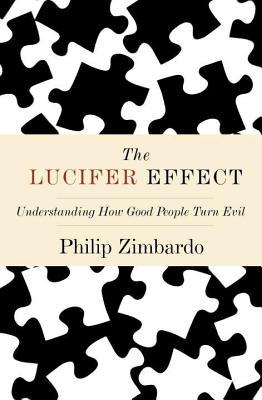
A demon is a malevolent supernatural entity. Historically, belief in demons, or stories about demons, occurs in religion, occultism, literature, fiction, mythology, and folklore; as well as in media such as comics, video games, movies, and television series.

A devil is the personification of evil as it is conceived in various cultures and religious traditions. It is seen as the objectification of a hostile and destructive force. Jeffrey Burton Russell states that the different conceptions of the devil can be summed up as 1) a principle of evil independent from God, 2) an aspect of God, 3) a created being turning evil, and 4) a symbol of human evil.

Evil, or being bad, in a general sense, is acting out morally incorrect behavior, or the condition of causing unnecessary pain and suffering, thus, containing a net negative on the world.

Jinn – also romanized as djinn or anglicized as genies – are invisible creatures in early religion in pre-Islamic Arabia and later in Islamic culture and beliefs. Like humans, they are accountable for their deeds and can be either believers (Muslims) or disbelievers (kafir), depending on whether they accept God's guidance. Since jinn are neither innately evil nor innately good, Islam acknowledged spirits from other religions and was able to adapt them during its expansion. Jinn are not a strictly Islamic concept; they may represent several pagan beliefs integrated into Islam. To assert a strict monotheism and the Islamic concept of tawhid, Islam denies all affinities between the jinn and God, thus placing the jinn parallel to humans, also subject to God's judgment and afterlife. The Quran condemns the pre-Islamic Arabian practice of worshipping or seeking protection from them.

The most common meaning for Lucifer in English is as a name for the Devil in Christian theology. It appeared in the King James Version of the Bible in Isaiah and before that in the Vulgate, not as the name of a devil but as the Latin word lucifer (uncapitalized), meaning "the morning star", "the planet Venus", or, as an adjective, "light-bringing". It is a translation of the Hebrew word הֵילֵל, hêlēl, meaning "Shining One".

Satan, also known as the Devil, and sometimes also called Lucifer in Christianity, is an entity in Abrahamic religions that seduces humans into sin or falsehood. In Judaism, Satan is seen as an agent subservient to God, typically regarded as a metaphor for the yetzer hara, or "evil inclination". In Christianity and Islam, he is usually seen as a fallen angel or jinn who has rebelled against God, who nevertheless allows him temporary power over the fallen world and a host of demons. In the Quran, Shaitan, also known as Iblis, is an entity made of fire who was cast out of Heaven because he refused to bow before the newly created Adam and incites humans to sin by infecting their minds with waswās.

Satanism refers to a group of religious, ideological and/or philosophical beliefs based on Satan – particularly the worship or veneration of him. Satan is a figure of the devil in Christian belief, a fallen angel and leader of the devils who tempts humans into sin. For many centuries the term was used by various Christian groups as an accusation against ideological opponents. Actually self-identified Satanism is recent, and is thought to have begun with the founding of the Church of Satan by Anton LaVey in the United States in 1966 – that "church" being an atheistic group that does not believe in a literal Satan. Sharing "historical connections and family resemblances" with Satanism, and sometimes overlapping with it, are paganism, ceremonial magic, and "other dark entities such as Set, Lilith, Hecate, and Chaos", from the occult and the 'Left Hand Path milieu.'

In the philosophy of religion, a theodicy is an argument that attempts to resolve the problem of evil that arises when omnipotence, omnibenevolence, and omniscience are all simultaneously ascribed to God. Unlike a defence, which merely tries to demonstrate that the coexistence of God and evil is logically possible, a theodicy additionally provides a framework wherein God's existence is considered plausible. The German philosopher and mathematician Gottfried Leibniz coined the term "theodicy" in 1710 in his work Théodicée, though numerous attempts to resolve the problem of evil had previously been proposed. The British philosopher John Hick traced the history of moral theodicy in his 1966 work Evil and the God of Love, identifying three major traditions:
- the Plotinian theodicy, named after Plotinus
- the Augustinian theodicy, which Hick based on the writings of Augustine of Hippo
- the Irenaean theodicy, which Hick developed, based on the thinking of St. Irenaeus

The Taxil hoax was an 1890s hoax of exposure by Léo Taxil, intended to mock not only Freemasonry but also the Catholic Church's opposition to it.

The Monk: A Romance is a Gothic novel by Matthew Gregory Lewis, published in 1796. A quickly written book from early in Lewis's career, it was published before he turned twenty. It is a prime example of the type of Gothic that specialises in the aspect of horror. Its convoluted and scandalous plot has made it one of the most important Gothic novels of its time, often imitated and adapted for the stage and the screen.

Fallen angels are angels who were expelled from Heaven. The literal term "fallen angel" does not appear in any Abrahamic religious texts, but is used to describe angels cast out of heaven or angels who sinned. Such angels often tempt humans to sin.

The Satanic Bible is a collection of essays, observations, and rituals published by Anton LaVey in 1969. It is the central religious text of LaVeyan Satanism, and is considered the foundation of its philosophy and dogma. It has been described as the most important document to influence contemporary Satanism. Though The Satanic Bible is not considered to be sacred scripture in the way that the Christian Bible is to Christianity, LaVeyan Satanists regard it as an authoritative text as it is a contemporary text that has attained for them scriptural status. It extols the virtues of exploring one's own nature and instincts. Believers have been described as "atheistic Satanists" because they believe that God and Satan are not external entities, but rather projections of an individual's own personality—benevolent and stabilizing forces in their life. There have been thirty printings of The Satanic Bible, selling over a million copies.
Morgan Scott Peck (1936–2005) was an American psychiatrist and best-selling author who wrote the book The Road Less Traveled, published in 1978.

The Blank Slate: The Modern Denial of Human Nature is a best-selling 2002 book by the cognitive psychologist Steven Pinker, in which the author makes a case against tabula rasa models in the social sciences, arguing that human behavior is substantially shaped by evolutionary psychological adaptations. The book was nominated for the 2003 Aventis Prizes and was a finalist for the Pulitzer Prize.

In Christianity, the Devil is the personification of evil. He is traditionally held to have rebelled against God in an attempt to become equal to God himself. He is depicted as a fallen angel, who was expelled from Heaven at the beginning of time, before God created the material world, and is in constant opposition to God. The devil is conjectured to be several other figures in the Bible including the serpent in the Garden of Eden, Lucifer, Satan, the tempter of the Gospels, Leviathan, and the dragon in the Book of Revelation.

The Science of Good and Evil: Why People Cheat, Gossip, Care, Share, and Follow the Golden Rule is a 2004 book by Michael Shermer on ethics and evolutionary psychology. The book was published by Henry Holt and Company.
Neoplatonism is a version of Platonic philosophy that emerged in the 3rd century AD against the background of Hellenistic philosophy and religion. The term does not encapsulate a set of ideas as much as a series of thinkers. Among the common ideas it maintains is monism, the doctrine that all of reality can be derived from a single principle, "the One".

Howard Bloom is an American author. He was a music publicist in the 1970s and 1980s for singers and bands such as Prince, Billy Joel, and Styx. He has published a book on Islam, The Muhammad Code, an autobiography, How I Accidentally Started The Sixties, and three books on human evolution and group behavior: The Genius of the Beast, Global Brain, and The Lucifer Principle.

In religion, ethics, philosophy, and psychology, "good and evil" is a very common dichotomy. In cultures with Manichaean and Abrahamic religious influence, evil is perceived as the dualistic antagonistic opposite of good, in which good should prevail and evil should be defeated. In cultures with Buddhist spiritual influence, both good and evil are perceived as part of an antagonistic duality that itself must be overcome through achieving Śūnyatā: emptiness in the sense of recognition of good and evil being two opposing principles but not a reality, emptying the duality of them, and achieving a oneness.

The Lucifer Effect: Understanding How Good People Turn Evil is a 2007 book which includes professor Philip Zimbardo's first detailed, written account of the events surrounding the 1971 Stanford Prison Experiment (SPE) – a prison simulation study which had to be discontinued after only six days due to several distressing outcomes and mental breaks of the participants. The book includes over 30 years of subsequent research into the psychological and social factors which result in immoral acts being committed by otherwise moral people. It also examines the prisoner abuse at Abu Ghraib in 2003, which has similarities to the Stanford experiment. The title takes its name from the biblical story of the favored angel of God, Lucifer, his fall from grace, and his assumption of the role of Satan, the embodiment of evil. The book was briefly on The New York Times Non-Fiction Best Seller and won the American Psychological Association's 2008 William James Book Award.

















